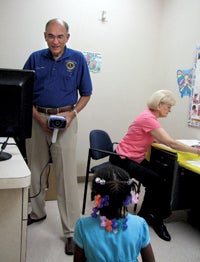Can you see me now?
Published 11:15 pm Wednesday, October 19, 2011
It’s tough to get 3-year-olds to sit still for long, but volunteers from the Lions Club needed their attention for just a couple of seconds on Wednesday to catch vision problems that could change their lives.

Test: Dr. John Watters, a retired eye doctor and Lions Club member, uses a scanner specifically made to check children’s vision to test 3-year-old Amayah Lee’s eyes at the CDI Head Start Center Wednesday. Ten volunteers tested the sight of more than 150 children at the center.
Using a scanner specifically made for screening children’s vision, the volunteers checked out the eyes of more than 150 preschool-aged children at the Community Development Institute’s Head Start Center on Davis Boulevard.
This was the last stop for Lions Club volunteers, who have spent the past 45 days checking out the 1,500 children at the 24 Head Start Centers throughout Hampton Roads that provide care for economically disadvantaged children.
Ingried Aleksic, the health coordinator for CDI Head Start Serving Hampton Roads, said she asked the Lions to do vision testing on the children because it’s critical at a young age.
“They have such a reputation for vision,” she said. “When you think of the Lions Club, you think of vision.”
Ten volunteers from four clubs — one from Windsor, one from Virginia Beach and two from Chesapeake — participated in the testing.
The Lions used a scanner that checks for a variety of vision problems, such as nearsightedness and astigmatism, that are common causes of amblyopia, or lazy eye, which causes a person’s eye to lose the ability to see detail.
Nancy Watters, who is the co-chair for children services and PediaVision in the Lions Club’s southeastern Virginia district and the wife of a retired eye doctor, said it is easier to correct these vision problems if they are discovered before age 5.
“By the time a child is 5, the brain has taught the eyes to see,” she said. “It’s very important to get (testing) done before children are 5.”
The scanners don’t require verbal communication and can test children as young as 6 months old.
The children either pass the test or are referred to an eye specialist and are sent home with a letter that lists their results. However, the test result is not a diagnosis, and a vision screening does not replace a complete eye examination.
Aleksic said the school follows up with the parents of the referred students to ensure the problems are addressed.
Watters said most children don’t have trouble with the test, but if a child struggles to focus, it’s usually even more important to get a result.
“The harder they are to screen, the more serious their problem is usually,” Watters said. “If we can’t read a child at all, we refer them immediately.”
Aleksic said many parents told her the scanners are able to find problems other vision tests can’t.
“Everyone wants to put a focus on education,” she said. “But if the child can’t see (his or her) work, they can’t learn.”






